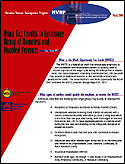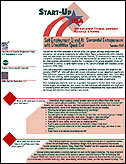
Information, resources and research about work and disability issues
Upcoming VCU CRP-RCEP Webcast
|
Public Policy Strategy in Support of Organizational Change Date: 5/20/2008 |
Time: 2:00 - 2:45pm ET |
After a decade of rapid implementation and expansion throughout the United States, supported employment hit a plateau. However, concepts such as self-determination and individual budgets have recently re-invigorated supported employment. The use of self-employment and other customized approaches also are serving to reinforce the promise of supported employment, which is that everyone has a place in the regular workforce. The focus of this session is on realizing a future characterized by state and federal-level commitment to supported employment. Included will be strategies to impact public policy, including an understanding of adequate funding and funding mechanisms for employment services and supports.
Register for this Webcast or the Entire Series
This activity is funded by grant (RRTC) #H133B040011 with the US DOE - NIDRR and by grant (CRP-RCEP) #H264B050007 with the US DOE - RSA.
Journal of Vocational Rehabilitation Article
Relationship between employment setting and job satisfaction among CRC personnel
The exploration of job satisfaction among rehabilitation counselors is not a new undertaking, but few studies have evaluated this construct across a full array of professional employment contexts. This investigation explores employment settings of rehabilitation counselors and their relationship to both job satisfaction and intentions to quit. The results revealed that employment setting does influence job satisfaction and retention for certified rehabilitation counselors. Overall, employees of the vocational rehabilitation system (the majority within this setting consisted of State vocational rehabilitation personnel n=662, followed by Veteran's Administration, Community Rehabilitation Programs, One Stop Centers and Independent Living Centers, n=88) reported the lowest amount of job satisfaction and a substantial degree of intention to quit.
Register for the Next 2008 Online Courses
Offered August 18 - November 10
Supported Employment Web-based Certificate Series - This online course provides an extensive overview of supported employment and how to facilitate competitive jobs for individuals with significant disabilities. Topics include:
- Federal Policy and Overview Customer Profile
- Marketing and Job Development
- Job-Site Support
- Special Topics
- Long Term Supports & Funding.
Earn 3.5 CEUs or 35 CRCs, and a certificate of completion. Cost: $175 per individual. Find Out More and Register Online
Supported Competitive Employment for Individuals with Mental Illness - This online course provides an extensive overview of supported competitive employment for individuals with mental illness. Sessions will include information on these important topics:
- Overview and Values Base
- Building Relationships with Business
- Establishing a Career Direction
- Locating Work Opportunities
- Employment Support
- Funding & Other Topics.
Earn 3.5 CEUs or 35 CRCs, and a certificate of completion. Cost: $175 per individual. Find Out More and Register Online
Homeless Veterans Reintegration Program
 Using Tax Credits to Encourage Hiring of Homeless and Disabled Veterans
Using Tax Credits to Encourage Hiring of Homeless and Disabled Veterans
What is the Work Opportunity Tax Credit (WOTC)? The WOTC is a federal tax credit that encourages employers to hire job-seekers with employment barriers by allowing them to recover a portion of the wages paid during the initial period of employment.
For many employers, especially small businesses, this tax credit may provide an additional incentive to hire and retain veterans who qualify for the credit. The Small Business and Work Opportunity Tax Act of 2007 extended the WOTC program through August 31, 2011. Read the Fact Sheet
HVRP (Homeless Veterans Reintegration Project) Technical Assistance Center is funded by grant #HV-16488-07-75-5-51with the US DOL.
Upcoming START-UP/USA Self-Employment Webcast
Small Business Development Center - Business Planning and Implementation Date: May 14, 2008 |
Time: 2:00 - 2:45pm ET |
A local Small Business Development Counselor can be a great assistant in the planning and implementation of a business plan. Because running a small business is a large challenge, a Small Business Development Center (SBDC) can help a business owner or potential owner assess their skills and weaknesses, and then build a team of support that will allow the owner to focus on his or her skills and obtain assistance on weaknesses.
This basic understanding is vital to the success and longevity of a small business. In this webcast, the focus will be on the level of service that can be expected by a person with a disability from the SBDC and the information that is needed from a SBDC counselor.
Register for this Webcast or the Entire Series (Earn CRCs/CEUs) * Individuals with disabilities may participate for free, please email tcblanke@vcu.edu for more information.
Start-Up-USA is funded by cooperative agreement # E-9-4-6-0111 from the U.S. DOL-ODEP.
START-UP/USA Self-Employment Fact Sheet
 Community Resources for Small Business Development
Community Resources for Small Business Development
Individuals with disabilities who want to start a business can find assistance and support from a number of different local agencies. These generic resources usually are funded by taxpayer dollars and are available to anyone including people with disabilities. Some of them include Small Business Development Centers (SBDC), the Service Core of Retired Executives (SCORE), One-Stop Career Centers, Business Leadership Networks (BLN), and others described in this Q&A.
An individual interested in owning a small business can obtain information, gain access to personal and professional networks with others who have similar interests, and locate additional business resources available within the community when connecting to these organizations.
Start-Up-USA is funded by cooperative agreement # E-9-4-6-0111 from the U.S. DOL-ODEP.
National Institute on Disability and Rehabilitation Research (#H133B040011)
1314 West Main Street | P.O. Box 842011 | Richmond, Virginia 23284-2011
Phone: (804) 828-1851 | TTY: (804) 828-2494 | Fax: (804) 828-2193
| | |
